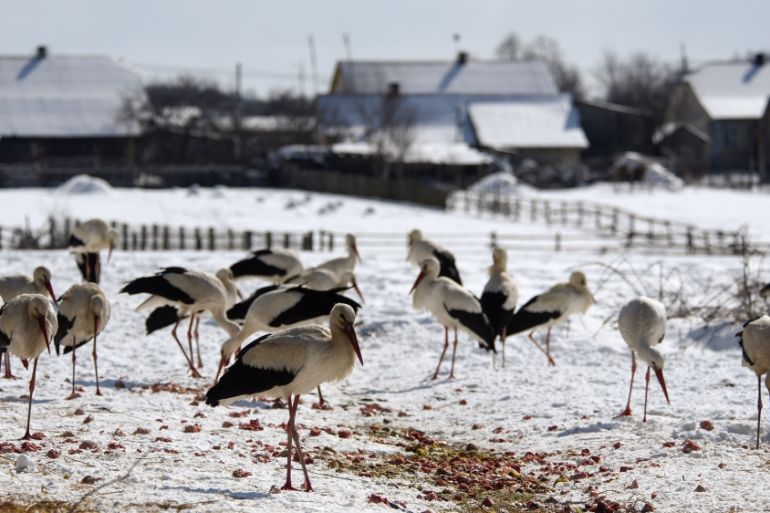Ukraine: Saving white storks from the spring snow
Locals help migrant birds through bad weather.

After wintering in South Africa, thousands of white storks (Ciconia ciconia) have been undertaking their spring migration, with many of them landing in Ukraine.
Their exhausting journey has taken them over Sudan, Egypt, Turkey, Bulgaria and Romania.
Keep reading
list of 4 itemsAfter the Hurricane
World’s coral reefs face global bleaching crisis
Why is Germany maintaining economic ties with China?
Although the majority of the birds (around 40,000) head to Poland, 15,000 storks chose Ukraine as their final destination to begin preparations for breeding.
These birds are looking for the best feeding grounds, seeking out the insects, frogs, mice and earthworms which will give them the energy required to produce and rear their young.
Arriving in Ukraine and other eastern parts of Europe means there is always the chance of snow on the ground. That has certainly been the case this year, with heavy snowfall over the last few days, and the prospect of more cold, snowy weather in the next few days.
This is prompted those in the western regions of Chernivtsi and Ivano-Frankivsk to come to the storks’ aid. They have been placing layers of hay on top of the snow to help insulate the birds from the worst of the cold. Scraps of fish and meat, which the storks seem to readily accept as a replacement for their regular diet, have been distributed across the feeding grounds.
Many Ukrainians feel they have a special relationship with the white stork.
It is considered the national bird of Ukraine, and it is seen as a symbol of family, loyalty and patriotism. If a stork nests on the roof of your house it is said to bring good luck.
According to legend, the stork originated from a human who offended God and was turned into a bird for their sins.
When asking the question, “Where do babies come from, Mummy?” the easy answer has always been, “The stork brings them.” That was how the titular character was delivered to his mother in the Disney film, Dumbo.
This idea is likely to have originated in this part of Europe as the arrival of the white stork in spring probably coincided with an increasing number of pregnancies and births during the spring and summer months.
Although the worst of the snow is probably over, cold weather is expected to persist in Ukraine in the coming days. Hopefully, the storks will breed successfully. If so, their chicks will spend two to three months with their parents before gathering in the wetlands of Ukraine, ahead of their long journey to their winter feeding grounds in South Africa.